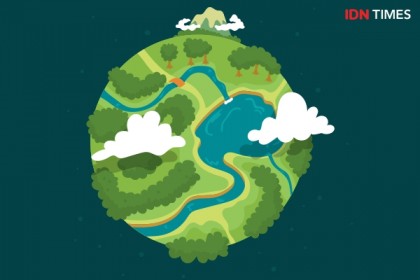Learnmistake – Earth Day, celebrated every year on April 22, is a global event dedicated to raising awareness about environmental issues and promoting actions to protect our planet. What began as a national movement in the United States has evolved into an international day of environmental activism observed by more than 1 billion people in over 190 countries.
The Origin of Earth Day
Earth Day was first celebrated on April 22, 1970, in the United States. It was founded by Senator Gaylord Nelson from Wisconsin, who was inspired to create a national environmental teach-in following a massive oil spill in Santa Barbara, California, in 1969.
With support from activist Denis Hayes, Earth Day quickly gained momentum. On that first Earth Day, over 20 million Americans participated in rallies, protests, and community clean-ups to demand action against pollution, toxic waste, and environmental degradation.
Why April 22?
Senator Nelson chose April 22 because it fell between Spring Break and final exams—an ideal time for students to get involved. College campuses across the U.S. became hubs for activism and education on ecological issues.
Earth Day Goes Global
In 1990, Earth Day went international. More than 200 million people in 141 countries participated, helping to boost environmental awareness around the world. The event also played a role in paving the way for the 1992 United Nations Earth Summit in Rio de Janeiro.
Today, Earth Day is coordinated globally by Earthday.org and focuses on a wide range of environmental issues such as climate change, deforestation, plastic pollution, biodiversity loss, and clean energy.
Themes and Campaigns
Each year, Earth Day features a different theme. Some recent themes have included:
- 2020: Climate Action
- 2021: Restore Our Earth
- 2022: Invest in Our Planet
- 2023: Earth vs. Plastics
- 2024: Planet vs. Plastics
These themes aim to inspire specific actions and policy changes to address global environmental challenges.
How People Celebrate Earth Day
People celebrate Earth Day in various ways, including:
- Planting trees and creating community gardens
- Organizing clean-ups in local parks, beaches, and neighborhoods
- Hosting environmental education workshops
- Advocating for policy changes on climate and conservation
- Participating in marches, digital campaigns, and art installations
The Legacy of Earth Day
Earth Day has helped inspire landmark environmental laws in the U.S., such as the Clean Air Act, Clean Water Act, and Endangered Species Act. It has also played a role in shaping the global environmental movement, encouraging individuals and governments to take responsibility for protecting the Earth.
As environmental challenges grow more urgent, Earth Day continues to serve as a powerful reminder that every action counts and that we all have a role to play in creating a sustainable future.
Let me know if you’d like a version of this in a more formal or casual tone!
